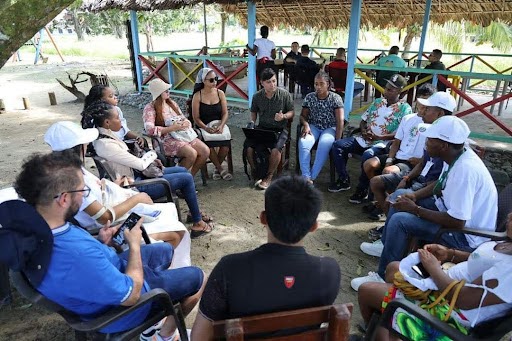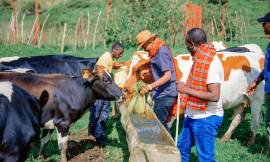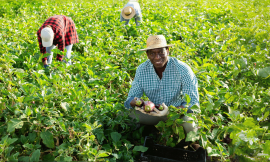Editor’s Note: With global food demand projected to grow by 70 per cent by 2050, engaging young agripreneurs is essential for boosting agricultural innovation and resilience. This piece explores how tailored, inclusive financing that co-designs solutions with youth can bridge investment gaps, strengthen rural economies and ensure sustainable food systems remain responsive to the challenges of climate change and food security.
Sixteen per cent of the global population is made up of young people under the age of 24. If the definition of youth is expanded to those under the age of 35, as adopted by the African Union, the percentage rises even higher. Many of these young people are already involved in the agrifood systems, often in informal job settings. According to IFAD, the average age of individuals who spend productive time on their own farms or family farms is 34.
As climate change, food insecurity, and rural unemployment increasingly intersect, empowering these young people with the right tools, knowledge, and resources is no longer optional—it is essential. One of the most critical, yet under-addressed, barriers facing young people in agriculture is access to quality financing and opportunities that support agricultural innovation.
At YPARD (Young Professionals for Agricultural Development), we work with young agripreneurs across the globe, supporting their efforts to scale local solutions and drive sustainable development in their communities. Yet, their path is often obstructed by structural barriers within finance systems and a lack of inclusive funding mechanisms. Despite the rhetoric, global youth-led initiatives receive less than 1 per cent of climate finance. For youth-led agribusinesses, this gap is particularly problematic given the additional risks and constraints they face.
From grassroots to global: bridging the financing gap
Young people are already actively involved in their local food systems. However, their grassroots initiatives often remain small- or medium-scale due to limited access to finance, lack of collateral and rigid eligibility criteria. While donors often express enthusiasm for youth interventions, this excitement comes too late, usually after the planning phase. To ensure long-lasting impact, youth perspectives must shape the very foundations of programme development.

Furthermore, quality climate and agricultural finance must prioritise long-term sustainability, local ownership and equitable access. The structure of the funding—whether it comes as a grant, loan or equity investment—matters significantly. Equally important is whether the funding mechanisms are developed in collaboration with youth and local stakeholders.
Too often, top-down approaches fail to reflect on-the-ground realities, resulting in limited impact. Youth-led agribusinesses need financial solutions that understand their context and empower them to scale sustainably. A classic example? Funding programs for small volumes of finance which require a legal body, twice a year reporting and a financial audit. A great mid-way solution is to suggest a host organisation for the funds and light operational reporting (i.e., photos and a short article).
Advocacy for structural reforms that make financing more inclusive for young people in agriculture should also be continually improved. This includes the promotion of blended finance and microfinance mechanisms, which help lower the entry barrier for young agripreneurs while also mitigating risks for investors.
However, access to finance alone is not enough. Mentorship and financial literacy programs are essential to ensure that young people not only receive funding but are also equipped with the skills and knowledge to manage and grow their ventures effectively. Just as critical is inclusive decision-making. When youth are engaged as co-creators in programme design, implementation and monitoring, the resulting financial mechanisms are more likely to align with their actual needs.
Donors also benefit from deeper cooperation with youth organisations. When both sides are in the same room, co-creating solutions, the outcome is often more practical, sustainable and scalable.
Practical strategies for young people and donors
Through years of experience and collaboration, YPARD has identified several practical strategies to help youth organisations access quality finance. Forming partnerships—especially as part of consortiums—enables young organisations to apply for larger grants and contribute to more ambitious projects. It is important to consider that even when a partner cannot offer direct funding, they can provide intellectual or technical support that strengthens the overall proposal. Understanding donor trends is equally important, as priorities in international development shift frequently. Aligning project ideas with a donor’s evolving strategy and impact goals greatly increases the chances of success.

Beyond financial capital, young leaders must also recognise the importance of intellectual, technical and human resources. Networks can be powerful assets, especially when direct funding isn’t available—donors may still facilitate valuable connections. Building strong donor relationships requires time and presence: attending relevant events, engaging in development dialogues, and being prepared with a clear, compelling elevator pitch. Demonstrating both readiness and relevance fosters trust, positioning youth not just as recipients of support but as credible partners in development.
A call to action for inclusive finance
Transforming food systems requires bold investments in youth-driven agricultural innovation. But this is not only a question of more funding; it is about creating ecosystems where youth-led solutions can thrive. Young professionals are eager to contribute, but need the support of coherent, responsive sustainable and inclusive finance mechanisms.
We call on donors, governments, private sector actors and civil society to collaborate with young agripreneurs not as beneficiaries, but as equal partners in development. By connecting finance to innovation and innovation to youth, we can unlock a more resilient and equitable future for all.
Cover image credits: YPARD Uganda team






